Year 9 | 2022
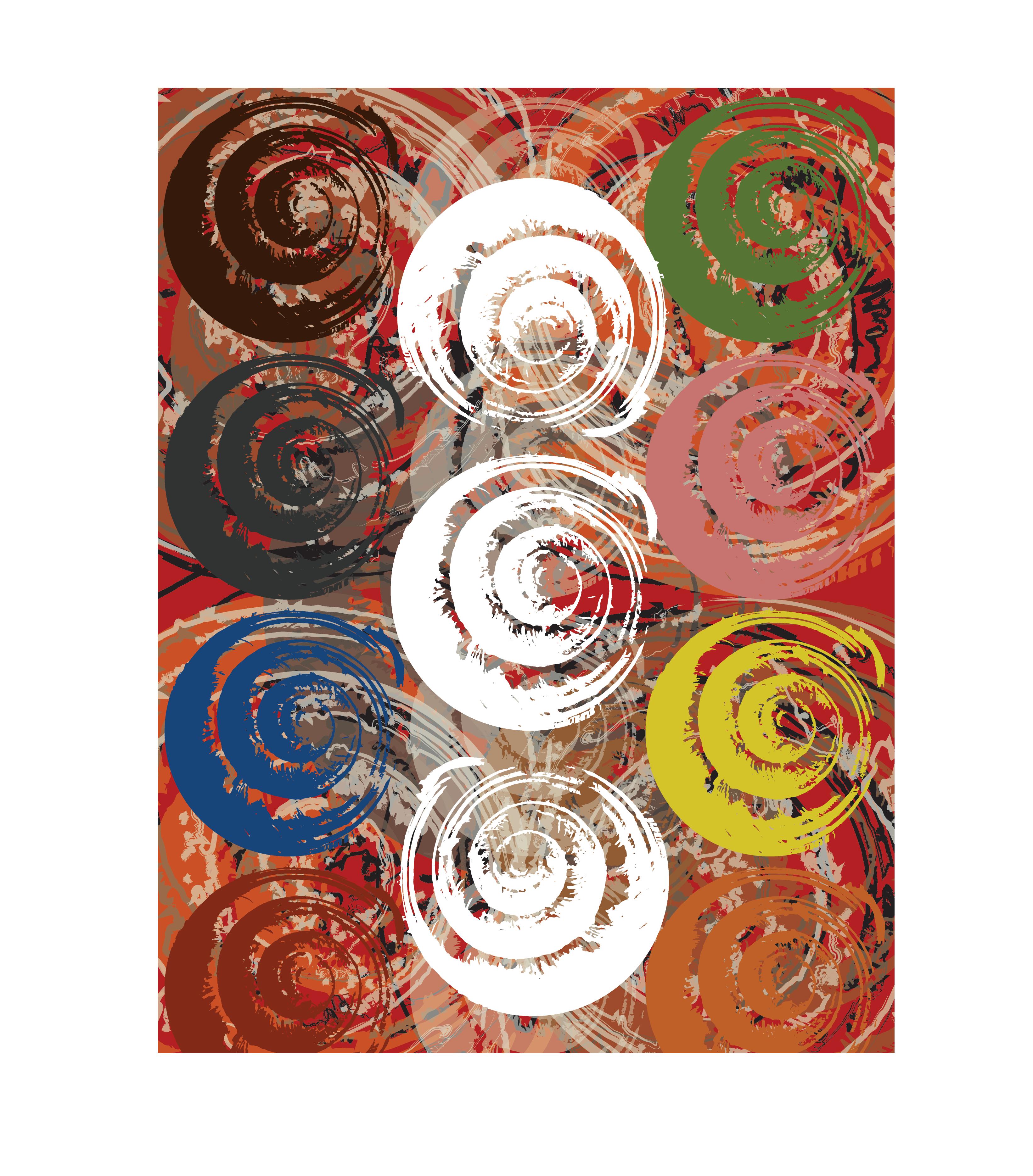
Options Booklet

CONTENTS Introduction Choosing Options - Key Considerations What Can I Choose Moving to College Compulsory Subjects GCSE English Language GCSE English Literature GCSE Mathematics GCSE Science - Combined & Triple Physical Education Religious Education EBACC Subjects GCSE History GCSE Geography GCSE French GCSE Spanish GCSE Computer Science Optional Subjects GCSE Art, Craft and Design (Art, Craft and Design) GCSE Art, Craft and Design (Photography) Cambridge National Level 1/2 in Creative iMedia GCSE Dance GCSE Design Technology - Timber based materials GCSE Drama Level 2 Vocational Award in Hospitality and Catering BTEC Music: Level 1 / 2 Technical Award in Music Practice NCFE Level 1/2 Technical Award in Health and Fitness (PE) Pearson BTEC Level 1/Level 2 Tech Award in Health and Social Care (To be con rmed) GCSE Sociology GCSE Further Mathematics and Statistics FAQ’s How Do I Decide Which Subject To Choose Access to Careers Information & Advice Quali cations Guide 1 2 3-4 5 6 7 8 9 10 11 12 13 14 15 16 17 18 19 20- 21 22 23 24 25 26-27 28 29 30 31 32 33 34 35 36 37 PAGE
Year 9 Options 2024 - Introduction
Welcome to Peacehaven Community School’s options process. This is an important time for you, as this is the rst time that you will need to make decisions which will a ect your future career choices. At Peacehaven Community School, we will o er you a wide range of options for Years 10 and 11.
We believe that our options are both exciting and unique and re ect our intention to o er an appropriate curriculum for all our students. All students will have to follow some ‘core subjects’ but they can then choose from a variety of subjects. This allows all our students to choose the subjects that interest them the most. We aim to help guide you in making the right options choices.
All students will have information from various sources, from assemblies to taster sessions, to conversations with students who have already started their options choices. There will be an options/parents evening which you and your parents will be able to attend to ask questions about options subjects. Take time to speak to teachers who run di erent courses to ensure that you are making the right choice for you.
When making your choices, think about your strengths and future career plans, do not base your choices on which teachers you like and what your friends are doing. Take advice from your teachers and parents/ carers - ultimately the decision must be yours.
You are going to have to work hard at your options for the next two years so it is important you choose subjects that you enjoy and that you can be successful in. If you are unsure about the options process, please talk to your mentor.
KEY DATES
You
INTRODUCTION
Options assemblies Options information evening KS4 Subject taster session Year 9 Parents evening/options evening Deadline for completion of choices Tuesday 20th February - Tuesday 5th March
will
invited
an
Tuesday 20th
Thursday 22nd
28th
Monday 6th March Wednesday 6th March Monday 15th March PAGE 1
be
to
evening on either:
February
February Wednesday
February
CHOOSING OPTIONS - KEY CONSIDERATIONS
1. Quality rather than Quantity
The majority of options courses result in a GCSE or equivalent. Most students will study for nine quali cations. Gaining eight or nine quali cations with higher grades is more useful than having a larger number of low-grade quali cations.
2. A Balanced Curriculum
Make sure your choices are broad and balanced- even if you have a speci c career path in mind. It is normal to change your mind about what career you want so it is worth keeping as many doors open as possible. A broad and balanced curriculum will allow you exibility in your career choices once you have nished your education and it will also show that you are well-rounded. Take subjects you enjoy even if it is not something you think will help you in your career.
CHOOSING OPTIONS DO’S & DON’TS
Do Don’t
Make sure you are well informed, especially about the new courses you have not studied before.
Think about your likes and dislikes – these courses will be studied for the rest of your time at Peacehaven Community School.
Think about your future as pirations – don’t close the doors by picking courses that are all very similar.
Think about your chances of success. The be�er the grades, the greater the opportuni�es post-16.
Just choose what your friends are doing, these are your choices not theirs.
Make choices based on teachers that you like – they may not teach you next year.
Choose what you ought to do rather than what you want to do – make sure you choose subjects that you will enjoy and be successful at.
Follow family traditions if they are not right for you. Choose a course because you want to and feel you will be successful at it.
PAGE 2
1. Compulsory subjects
WHAT CAN I CHOOSE?
All students will work for GCSEs in English Language, English Literature, Maths and Sciences (usually Combined Science). Students with the highest grades in year 9 Science will be able to choose Triple Science. All students will also study practical P.E. and Religious Education. These subjects are not examined.
Students will either be entered for the English Baccalaureate route or the non-English Baccalaureate route.
If these two choices are not suitable the school will contact you directly to o er an alternative.
2. What is the English Baccalaureate?
The EBacc is a measure being used by colleges, universities and employers to judge student achievement, with the emphasis being on a traditional academic curriculum. To achieve the EBacc quali cation, students must pass at least 8 GCSEs or equivalents, including:
• English Language and Literature
• Mathematics
• History or Geography
• A modern foreign language
• Two Sciences
Further choices may be made from the Free options list.
If you are not following the English Baccalaureate you will need to choose a humanities subject (History and Geography) and make two further choices.
3. Free options
Students may choose options from the list below. Restrictions apply to some options.
GCSE Subjects
Art and Design (Art, Craft and Design)
Art and Design (Photography)
Computer Science
Dance
Design and Technology - Timber based materials
Drama
French
Geography
History
Sociology
Spanish
Further Maths and Statistics
Triple Science
GCSE Equivalent Subjects
NCFE Level 1/2 Technical Award in Health and Fitness (PE)
BTEC Music: Level 1 / 2 Technical Award in Music Practice
BTEC Level 1/Level 2 Tech Award in Health and Social Care
Cambridge National Level 1/2 in Creative iMedia
Level 2 Vocational Award in Hospitality and Catering
PAGE 3

WHAT CAN I CHOOSE?
4. Reserve Choice
All students must make two reserve choices on the options form. These can be from any of the subjects o ered. The reserve choices should be listed in order of preference.
We will always try our best to ensure that you get the choices you have made; however, there are times when this proves impossible. There are several reasons for this; for example, some courses may not run if there is not enough demand or some subjects may clash on the timetable.
We will always let you know if this happens. It is therefore really important that you think as carefully about your reserve choices as you do about your rst choices.
Forms will be emailed to parents and need to be completed and returned by 15th March
Any questions regarding the options process should be directed to Mr Hughesmark.hughes@swale.at or Ms Pollard - michelle.pollard.pcs@swale.at in the rst instance.
For any questions relating to speci c subjects please contact the Subject Leader. Their contact details are in this booklet. Unfortunately, PCS cannot guarantee to run an option subject if an insu cient number of students choose it and we are unable to guarantee any combination of options.
WHERE TO FIND HELP
For more information on speci c options, you can talk to the following teachers:
Art/Photography
Computer Science
Dance
Drama
Design Technology
English
Food Technology
Geography
History
Mathematics
Modern Foreign Languages
Music
PHSE
Physical Education
Science
Sociology
SCLN Teacher
SENCO
Charlotte Parr
Sam Hamblin
Emily Hulatt or Olivia L'etang (maternity cover)
Emily Stephens
Phillip Cornish
Lauren Haywood
Gavin Desborough
Basil Loggenberg
Lucy Olding
Ezra Leonce
Kate Hayhurst
Thomas Himsworth
Olivia L'etang
James Clarke
Lisa Murray
Anna Wharfe
Susie Scotting
Ashley Curcio
PAGE 4

MOVING TO COLLEGE
College websites provide excellent insights into what subjects and grades you need to be achieving. The prospectuses from colleges should be used as a guide to their individual requirements. Below is a rough guide:
To study three A Levels, you will need to have six GCSEs at grade 4 including English and Maths. Some colleges will need more.
The majority of students will study three A Levels, some students study four A Levels. Check the college website for requirements especially if choosing double Maths.
To study the International Baccalaureate you will need at least seven GCSEs at grade 4 or equivalent, including English or Maths and Science.
To study a vocational level 3 course, you will need ve GCSEs at grade 4 or equivalent including English or Maths depending on the college.
To study a vocational level 2 course, you will need ve GCSEs at grade 3 or equivalent including English depending on the college.
Many courses need speci c grades at GCSE. You must check this information yourself. The list below is a general guide and will di er from college to college.
Any Art A-level
Any Science A-level
Any Languages A-level
Maths
Double Maths (Maths and Further Maths)
Computer Science
Music
Minimum requirement of a GCSE Grade 4 or 5 at Art (Dependent on college)
Two Grade 6 GCSEs in Science, including the Triple Science selected (e.g. Physics for Physics A Level) or Combined Science, plus Grade 5 in Maths and English.
At least a grade 6 achieved at GCSE in the chosen language and 4 in English Language
Grade 6 GCSE in Maths (and 4 in English for BHASVIC)
Grade 7 GCSE in Maths (and 4 in English for BHASVIC)
Grade 6 in Maths GCSE
Grade 6 or above in Music GCSE or Grade 5 instrumental exam
For any other A Level course, a GCSE on the same subject is NOT a requirement e.g. Drama, Sociology, Psychology. However, if you have taken the GCSE, a specific grade may be required.
PAGE 5
COMPULSORY SUBJECTS
PAGE 6
COMPULSORY SUBJECTS
GCSE English Language
Course Content
English Language is designed to develop your reading, writing, speaking and listening skills. The course will teach you to read uently in order to understand and analyse a variety of texts. It will also develop your communication skills to enable you to express yourself appropriately and with accuracy. By the end of the course, you will have developed the skills you need to understand and communicate e ectively in the adult world. The course will build on the skills you have been learning at KS3. In reading, you will be expected to become an active and critical reader. In writing, you will be expected to develop your vocabulary and the accuracy of your grammar, punctuation and spelling in order to express yourself precisely. In spoken language, you will be expected to listen attentively to others and to express your ideas e ectively using Standard English.
Course Structure
You will read and be assessed on high-quality, challenging texts from the 19th to 21st centuries. The texts, across a range of genres and types, will support you in developing your own writing by providing e ective models. The texts will include literature and extended literary non- ction, and other writing such as essays, reviews and journalism (both printed and online). You will develop your skills in critical reading and comprehension, summary and synthesis, evaluation of writers’ techniques, comparing texts, producing clear and coherent writing, writing for impact, presenting information and ideas and responding to others’ spoken language.
Homework
You will be set homework on Seneca, for either English Language or English Literature, each week. The tasks have been carefully chosen to further develop the reading, writing, speaking and listening skills that you are developing in class.
Assessment
Exam Board: AQA
Written Exams: 100%
(There are 2 separate exams for this subject) S
Course Progression
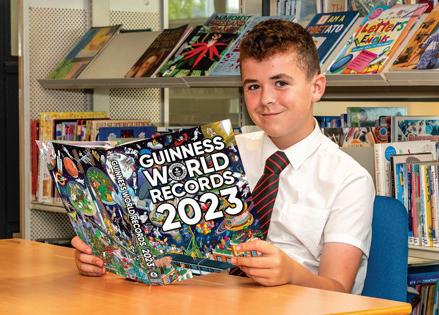
The course will prepare you for further study in any subject area because it focuses on developing your core reading, writing and spoken language skills.
Possible Careers
English Language students go on to study a wide variety of exciting courses, including Journalism, Publishing, Advertising, Linguistics, Creative Writing, Politics and Law.
Curriculum Leader - Ms Haywood - lauren.haywood@swale.at
PAGE 7
COMPULSORY SUBJECTS
GCSE English Literature
Course Content
English Literature is designed to develop your knowledge and skills in reading, writing and critical thinking. Through literature, you will have a chance to develop culturally and acquire knowledge of the best that has been thought and written. Studying GCSE English Literature will encourage you to read widely for pleasure. By the end of the course, you will have developed the skills you need to appreciate a wide variety of literature. The course will build on the knowledge and skills that you have acquired at KS3. In reading, you will be expected to become an active and critical reader. In writing, you will be expected to develop your ability to write essays about the texts that you have studied.
Course Structure
Your reading will deepen your understanding of literature, giving you the con dence to apply the skills to any text. You will study a range of high-quality, challenging texts in detail. These will include at least one play by Shakespeare, at least one 19th-century novel, and a selection of poetry since 1789, including representative Romantic poetry and ction and drama from the British Isles from 1914 onwards. You will develop so you can read a wide range of classic literature uently and with good understanding, and make connections across your reading. You will read in-depth, critically and evaluatively so that you are able to discuss and explain your understanding and ideas. You will develop the habit of reading widely and often and appreciate the depth and power of the English literary heritage. You will write accurately, e ectively and analytically about your reading, using Standard English while acquiring and using a wide vocabulary.
Homework
You will be set homework on Seneca, for either English Language or English Literature, each week. The tasks have been carefully chosen to supplement the work covered in class and to extend your knowledge and understanding of historical and social context.
Assessment
Exam Board: AQA
Written Exams: 100%
(There are 2 separate exams for this subject)
Course Progression
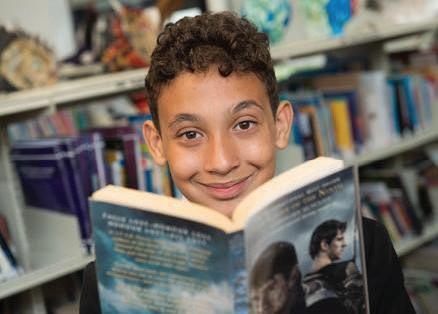
The course will prepare you for further study in any subject area requiring extended reading and analytical skills.
Possible Careers
English Literature students have gone on to study a wide variety of exciting courses, including Journalism, Publishing, Advertising, Education, Creative Writing, Politics and Law.
Curriculum Leader - Ms Haywood - lauren.haywood@swale.at
PAGE 8
COMPULSORY SUBJECTS
GCSE Mathematics
Course Content
This course will develop your numeracy, problem-solving, investigation and analytical skills allowing you to apply these skills in everyday life. It will teach you how to break problems down into small steps, spot patterns and analyse data.
Course Structure
During the course you will be studying six strands of Maths:
Numbers
Algebra
Ratio and Proportion
Geometry
Probability
Statistics
Homework
It is recognised that for a student to make expected progress in Maths they need to complete 45 minutes of homework a week in Years 10 and 11. Maths GCSE homework allows students to re ect on what they have learnt and check whether they are able to use the skills independently
Assessment
Foundation Students
(expected to achieve grade 1 to 5)
Exam Board: OCR
Written Exams: 100%
(There are 3 separate exams for this subject)
Higher Students
(expected to achieve grade 4 to 9)
Exam Board: OCR
Written Exams: 100%
(There are 3 separate exams for this subject)
Course Progression
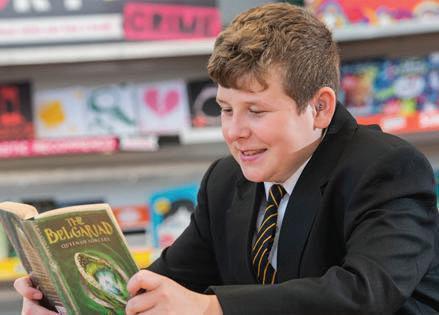
A-Level Maths, Sciences, Sociology, Engineering, Accountancy.
Possible Careers
Engineer, Scientist, Statistician, Architecture, Social Scientist.
Curriculum Leader - Mr Leonce - ezra.leonce@swale.at
PAGE 9
COMPULSORY SUBJECTS
GCSE Science - Combined & Triple
Course Content
There are two di erent routes available for students: Combined Science and Triple Science. Combined Science will result in two GCSEs in science, whereas Triple results in three GCSEs in Biology, Chemistry and Physics. Triple Science provides a more challenging route for those who are more con dent in Science or wish to study it in the future, as it covers each of the sciences in greater depth. Students must choose Triple Science as an option if they wish to take it.
Both courses teach you a combination of Biology, Chemistry and Physics. It provides you with the knowledge and skills you need to understand the world around you, to know how things work and to allow you to make informed decisions. You will undertake both practical and theory-based lessons, providing you with practical investigative skills, critical analysis and evaluation.
Course Structure
Science students will study the elds described below. Triple scientists will follow similar modules but go into greater depth. Alongside these modules, students will be taught practical skills. Biology: Cell level systems, Scaling up, Organism level systems, Community level systems, Interactions between systems and Global challenges. Chemistry: Particles, Elements, Compounds & Mixtures, Chemical, Reactions, Predicting and Identifying Reactions, Monitoring and Controlling Reactions and Global Challenges. Physics: Matter, Forces, Electricity and Magnetism, Waves and radioactivity, Energy and Global challenges.
All students will sit six exams in Science, in Triple Science these are longer resulting in three science GCSEs instead of two.
Homework
Students will have three Science teachers. They will each set a piece of homework each week. This will typically be through our online platform Educake.
Assessment
Exam board: OCR
Written Exams: 100%
There are 6 separate exams for this subject)
Course Progression
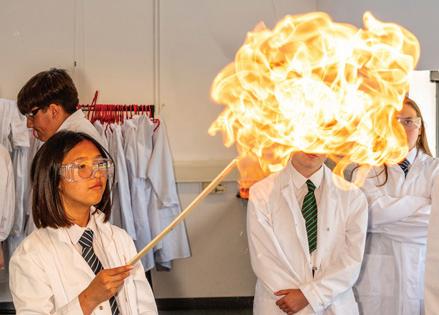
Many college courses will ask for Science GCSEs including A-level Physics, Chemistry, Biology, Environmental Science and Physical Education. Please note that although 3 Science GCSEs is desirable to progress onto ‘A’ levels in the Pure Sciences, it is not essential and the Double Science GCSE provides a solid foundation for ‘A’ levels in Biology, Chemistry and Physics.
Possible Careers
A sound knowledge of the sciences forms a useful background to many diverse and varied careers, for example in the elds of Medicine and Nursing, Forensic Science, Engineering, Sports Technology, Veterinary Science and Environmental Monitoring.
Curriculum Leader - Miss Murray - lisa.murray@swale.at
PAGE 10
Physical Education
All students will continue to participate in PE lessons, as a non-exam subject, until they leave.
The format will follow on from their rst 2 years. They will be introduced to di erent sports and activities, developing skills and understanding the bene ts of a healthy lifestyle. In Years 10 and 11, students can select a speci c “route” that they would like to participate in.
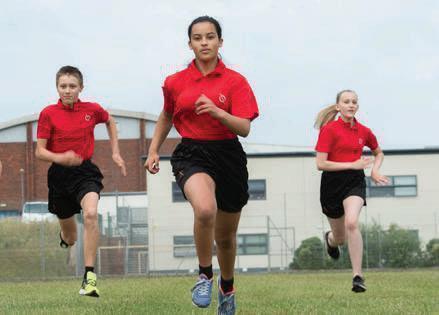
Each route is designed for di erent types of performers and much of the content students experience is designed by the students themselves.
In Year 9 students can opt for the NCFE V Cert in Health and Fitness, which is the equivalent to a GCSE and is taken in addition to core PE.
Curriculum Leader- Mr Clarke - james.clarke@swale.at
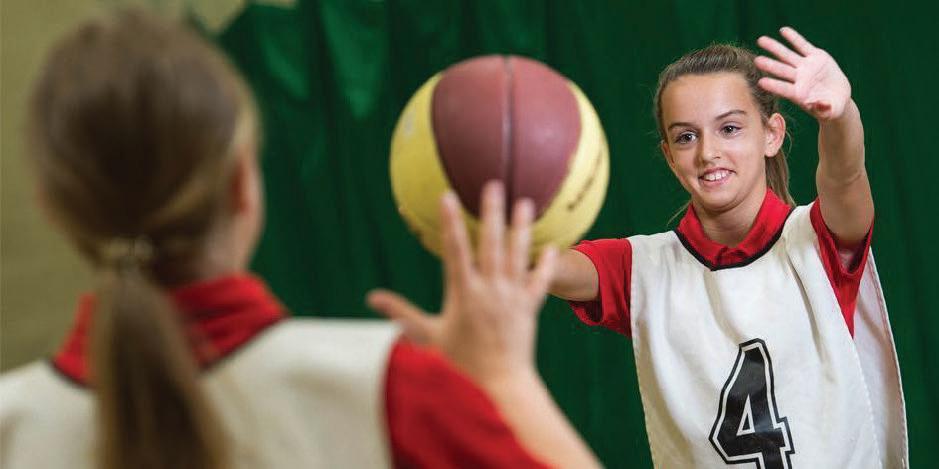
COMPULSORY SUBJECTS PAGE 11
COMPULSORY SUBJECTS
At PCS all students in every year group study 1 hour a week of RE.
Religious Education
RE Provokes challenging questions about what it means to be human, the ultimate meaning and purpose of life, issues of right and wrong and the nature of reality and beliefs about God.
It enhances student's knowledge and understanding of religious beliefs, concepts, teachings, practices and forms of expression, as well as of the in uence of religion on individuals, families, communities and cultures.
Furthermore, it develops students’ knowledge and understanding of Christianity, other principal religions, other religious traditions and world views that o er answers to these challenging questions. It also increases students’ religious literacy.
Religious Education stimulates discussion about:
Ultimate meaning
The purpose of life
Beliefs about God
The nature of self and the nature of reality
Religious Education o ers opportunities for: Students,learn from di erent religions, beliefs, values and traditions whilst exploring their own beliefs and questions of meaning and purpose.
Students re ect on, consider, analyse, interpret and evaluate issues of truth, belief, faith and ethics and communicate their responses.
Students develop their sense of identity and belonging, which enables them to ourish individually within their communities, as citizens of a pluralist society within a global community.
Religious Education enables students to: prepare themselves to face the challenges and responsibilities of adult life, employment and life-long learning.
Develop respect and sensitivity to others, in particular those with faiths and beliefs di erent from their own.
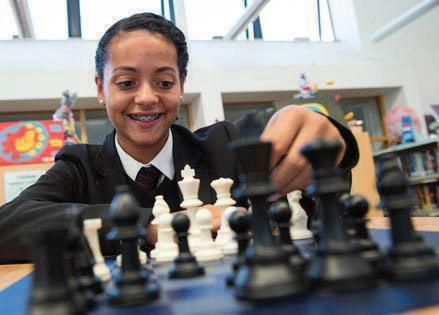
Combat prejudice, racism and discrimination; develop a re ective, discerning, caring approach to life.
PAGE 12
EBACC SUBJECTS
PAGE 13
EBACC SUBJECTS
GCSE History
Course Content
GCSE History enables students to learn about key events and people in the past so they have a better understanding of the world today and their place in it. In History, you will demonstrate knowledge and understanding of the key features and characteristics of the past. You will analyse, evaluate and use historical sources to make substantiated judgements, as well as analysing and evaluating why interpretations of history may di er.
Course Structure
Medicine Through Time c1250 - Present. This thematic study focuses on change and continuity from the Middle Ages to the present day. The key theme is understanding how changes in communication, technology and society have in uenced medicine over time. Case Study - Medicine on the Western Front. In this case study you will develop your source evaluation skills by examining historical documents to investigate how medicine developed as a result of World War One. Early Elizabethan England 1558-1588 In this British depth study you will study the reign of Queen Elizabeth I, from her accession as a young monarch to her victory over the Spanish Armada. You will gain a greater understanding of Elizabethan England and will explore all the challenges she faced, including the infamous threat from Mary Queen of Scots. Weimar and Nazi Germany 1918-39 I n this modern-depth study you will study the legacy of the First World War, the Weimar Republic, Hitler’s rise to power and what life was like in Nazi Germany. Superpower Relations and the Cold War, 1941–91 This unit covers the relationship between the USA and the Soviet Union in the 20th century. You will study the origins of the Cold War, key events such as the Cuban Missile Crisis and why the Cold War ended with the collapse of the Soviet Union.
Homework
Homework is set following the homework timetable. Tasks are primarily based online through SENECA.
Assessment
Exam Board: Pearson (Edexcel).
Written Exams: 100%
(There are 3 separate exams for this subject)
Course Progression
GCSE History is excellent preparation for future academic study such as A Level History, A Level Government and Politics, A Level Law.
Possible Careers
There are careers which use History directly such as Museum and Heritage work, Tourism, Archaeology or Teaching. History can provide valuable skills such as critical thinking, research, communication, and problem-solving, which apply to many other elds like law, politics, business, and more.
Curriculum Leader - Miss Lucy Olding - lucy.olding@swale.at
PAGE 14
EBACC SUBJECTS
GCSE Geography
Course Content
Geography is the study of the world and the problems facing our population both now and in the future, as well as proposing ideas to help solve these issues. The subject helps you to think creatively, innovatively, analytically and critically to tackle the ever-changing world in which we live in. You’ll have the opportunity to carry out both human and physical geography eldwork to study the subject in real-world settings. You will also gain geographical skills to apply in a range of situations by better understanding maps, photographs, statistics, diagrams and graphs.
Course Structure
Paper 1 - Physical Geography: Tectonic Hazards, Weather Hazards, Climate Change, Ecosystems, Tropical Rainforests, Hot Deserts, Rivers, Coasts.
Paper 2 - Human Geography: Urban Issues and Challenges (city studies of Lagos and London), The Development Gap, The Changing Economic World (country studies of Nigeria and the UK), Resource Management - Food, Energy and Water Issues.
Paper 3 - Geographical Application: A paper assessing your eldwork studies, geographical skills and evaluative skills based on a pre-release booklet combining all your geography knowledge from the course.
Homework
Homework is set following the homework timetable. asks are based around consolidating knowledge using online quizzes and preparing for assessments by creating revision resources and practising answering past paper questions.
Assessment
Exam Board: AQA
Written Exam: Unit 1 - 35%
Unit 2 - 35%
Unit 3 - 30%
Course Progression
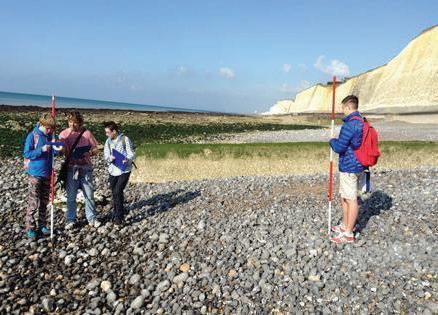
GCSE Geography is a very broad subject that has many links to other subjects and has options for future study such as: A Levels (Geography, Science, Politics, Environmental Studies, Economics, Sociology, History), BTEC Level 3 Subsidiary/Extended Diploma (Travel and Tourism, Agriculture, Countryside Management, Adventure Education).
Possible Careers
Geography is an incredibly useful subject to help you get a job as many careers welcome the skills that geography gives to an employee. Possible careers could include roles in the following elds: sustainability, green engineering, human rights, international relations, architecture, town planning, urban regeneration, hazard management, weather forecasting, and renewable energy. Geography can lead to a huge range of fascinating and important career paths to help shape the world of the future!
Curriculum Leader - Mr Loggenberg - basil.loggenberg@swale.at
PAGE 15
EBACC SUBJECTS
GCSE French
Our aim at Peacehaven Community School is for all of our learners to consider themselves ‘World Citizens’ who belong to a mutually cultural and respectful world. We support our students in understanding new cultures and link these to our own personal experiences. We encourage our students to be curious and interested in the world.
Course Content
You will learn and understand about French people and their lifestyles, explore French culture through lm, media and literature; develop your communication skills; learn how to speak spontaneously in new situations; learn the skills required for translation. You may have the opportunity to partake in a study trip abroad to use your language in context.
Course Structure
You will cover a range of topics including: identity and culture, youth culture, lifestyle, customs and traditions. Local, national, international and global areas of interest; home and locality, French-speaking countries, and global sustainability. Current and future study and employment: current study, world of work, careers and future plans.
Homework
Homework will be set weekly and should take approximately an hour. It will be based on exam-style questions, consolidating language introduced in class and using online language tests to secure vocabulary knowledge.
Assessment
Exam Board: AQA
Speaking exam - 25%
Role-Play. Reading aloud in French and a photo card discussion.
Listening exam - 25%
A range of listening comprehensions. A dictation written in French.
Reading exam - 25%
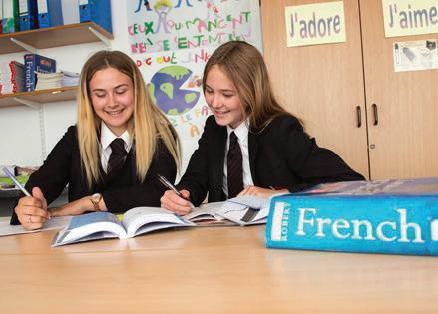
Understanding and responding to written texts. Understanding single words in sentences. Translation from French into English.
Writing exam - 25%
Two writing tasks. Translation from English into French. A grammar exercise (foundation tier).
Course Progression
A Level French.
Possible Careers
Travel and Tourism, the Foreign O ce, Customer Relations, Journalism, Translating, Teaching, Hospitality, International Business.
Curriculum Leader - Ms Hayhurst -kate.hayhurst@swale.at
PAGE 16
EBACC SUBJECTS
GCSE Spanish
Our aim at Peacehaven Community School is for all of our learners to consider themselves ‘World Citizens’ who belong to a mutually cultural and respectful world. We support our students in understanding new cultures and link these to our own personal experiences. We encourage our students to be curious and interested in the world.
Course Content
You will learn and understand about Spanish people and their lifestyles, understand Spanish culture through lm, media and literature and develop your communication skills. You will learn how to speak spontaneously in new situations and learn the skills required for translation. There may be the opportunity to partake in a study trip abroad to use your language in context.
Course Structure
Identity and culture: youth culture, lifestyle, customs and traditions. Local, national, international and global areas of interest: home and locality, Spanish-speaking countries, and global sustainability. Current and future study and employment: current study, world of work, careers and future plans.
Homework
Homework will be set weekly and should take approximately one hour. It will be based on exam-style questions, consolidating language introduced in class and using online language tests to secure vocabulary knowledge.
Assessment
Exam Board: AQA
Speaking exam - 25%
Role-Play. Reading aloud in Spanish and a photo card discussion.
Listening exam - 25%
A range of listening comprehensions. A dictation written in Spanish.
Reading exam - 25%
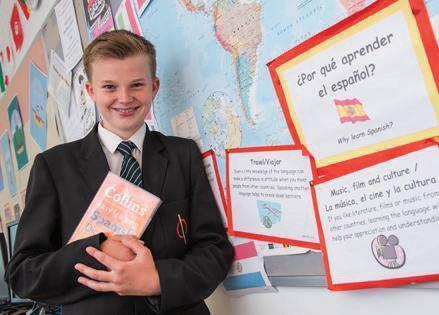
Understanding and responding to written texts. Understanding single words in sentences. Translation from Spanish into English.
Writing exam - 25%
Two writing tasks. Translation from English into Spanish. A grammar exercise (foundation tier).
Course Progression
A Level Spanish
Possible Careers
Travel and Tourism, the Foreign O ce, Customer Relations, Journalism, Translating, Teaching, Hospitality, International Business.
Curriculum Leader - Ms Hayhurst - kate.hayhurst@swale.at
PAGE 17
GCSE Computer Science
This option is only available to students’ who perform well in their January computing exam, which assesses student’s mathematical and logical skills required for the subject.
Course Content
Computer Science will give you an in-depth understanding of how computer technology works and a look at what goes on, “behind the scenes”. You will analyse problems in computational terms through practical experience of problem-solving. You will be producing algorithms, writing code (using Python) and debugging computer programs. This course will help you develop critical thinking, analysis and problem-solving skills.
Course Structure
Unit 1 – Computer Systems. Explore how computer systems work by studying key areas such as systems architecture, memory, storage, networks, system security, system software and a range of ethical, legal, cultural and environmental concerns
Unit 2 – Computational Thinking. Algorithms and Programming. Demonstrate computational thinking through algorithms and programming, techniques. Produce robust programs using computational logic, translators and facilities of computing languages and data representation.
Unit 3 – Programming Project. A practical assessment which requires students to plan, develop, test and evaluate a computer program which provides a solution to a given problem.
Homework
Homework is set following the homework timetable. Homework takes the form of practical tasks, research and exam questions.
Assessment
Exam Board: OCR
Written Exams:
Unit 1 - 50%
Unit 2 - 50%
Programming Assessment: Unit 3 - Assessed by subject teacher
Course Progression
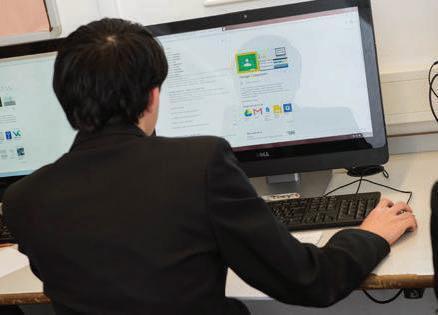
A Level Computer Science or other related computer science/ICT related courses
Possible Careers
Computer Science is relevant to and useful in almost all career pathways. Computer Science careers include; Computer Systems Analysts, Software Developer, Web Developers, Database Administrators, Computer Programmer, Software Engineer
Curriculum Leader - Mr Sam Hamblin - sam.hamblin@swale.at
EBACC SUBJECTS PAGE 18
OPTIONAL SUBJECTS
PAGE 19
OPTIONAL SUBJECTS
GCSE Art and Design (Art, craft and design)
If you enjoy being creative, want to increase your practical skills and improve your analytical, communication and research abilities, Art and Design is a great choice. The skills you gain make it a great complement to other subjects. Art and Design is a way of seeing things and making sense of the world around you. It can help you with further study and prepare you for the world of work. Studying art and design helps to create a broad and balanced curriculum, which is an excellent foundation for whatever you want to do afterwards. No matter what career you choose, those who can arrange, present and display material in a way that is aesthetically pleasing have an advantage. Art makes students look at things anew. Communicating with colour, shape and form awakens the imagination.
Course Content
This is a vibrant and dynamic subject where students will follow a broad-based course exploring practical and critical/contextual work through a range of 2D and 3D processes. Art, Craft and Design will encompass working in Fine Art, Textile Design, 3D design and recording using photography. It is important to be aware that a great emphasis is placed on students’ ability to draw using a range of techniques and for di erent purposes. Drawing will form the backbone of all units and exams and is a vital skill in this subject. In addition, students will be expected to produce substantial written analysis and evaluations of their work as it develops. The use of specialist vocabulary and terms is essential and must be explicit throughout their portfolios.
Unit 1 - Organic Elements: students will be given the opportunity to choose from 4 di erent pathways: ‘Underwater’, ‘In the Wild’, ‘Plant Life’ and ‘Near and Far’. They are given a list of recommended artists and designers and are encouraged to explore their own pathways, developing ideas for their own portfolios. Skills, techniques and processes will be taught that complement their pathways. Students are encouraged to explore a range of media and techniques - they can explore 2D art but they can also explore 3-dimensional materials and processes, from willow cane and air-dry clay to wire and modroc plaster.
Unit 2 - Mock Exam unit: This unit will be delivered as a mock exam spread over 12 weeks and culminating in a 5-hour exam in the Autumn Term. The theme will be ‘Architecture and a Sense of Place’, this shorter project will be nalised with a set of lino prints to be completed in the mock exam period.
Photography Produce images using light-sensitive materials such as photographic lm, or digital methods of development and production to create static or moving images. Areas of study could include portraiture, installation, photo-journalism, moving image: lm, video and animation and fashion photography.
Three-dimensional design The design, prototyping and modelling or making of products, objects, and environments, using intellectual, creative and practical skills. Areas of study could include sculpture, ceramics, product design, jewellery design and 3D digital design.
PAGE 20
OPTIONAL SUBJECTS
Textile design Your chance to design products for woven, knitted, stitched, printed or decorative textiles. Areas of study include fashion design and illustration, costume design, constructed textiles, printed and dyed textiles and digital textiles. Fine Art Fine Art explores ideas, conveys experiences or responds to a theme or issueo ssue of personal signi cance. The areas of study are very broad and cover drawing, painting, sculpture, installation and mixed media
What skills will you learn?
Alongside improving your practical expertise, you’ll learn how to: • develop, refine and record your ideas • present a personal response that realises your intentions • improve your creative skills through the e ective and safe use of media, materials, techniques, processes and technologies • successfully use visual language and the formal elements eg colour, line, form, shape, tone, texture • use drawing skills for different needs and purposes. How will it t in with your other subjects?
Homework
Homework is normally set weekly. Students will be expected to spend, on average, 2 hours a week on the tasks. However, some larger projects will be set over 3 or 4 weeks, with 2 hours per week expected. Self-management and commitment are key to producing your best work and ALL tasks will be evaluated for your assessment. A small range of art materials will be required at home to complete your homework tasks and will be available to buy at the start of the course. Alternatively, students can stay at one of our weekly art clubs to access materials and gain additional support. Homework is not optional.
Assessment
Exam Board: AQA
Portfolios: 60%
Controlled Assessment: 40%
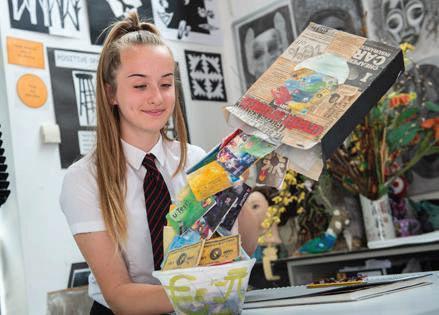
Course Progression You can continue your art and design studies at AS and A-level, in Photography, Graphic Design, 3D Design, Fine Art and Textiles. You’ll also be able to choose areas of study to specialise in within a particular title. If you don’t want to take your art and design studies any further, the transferable skills you gain will still be valuable.
Possible Careers Art and Design opensopen the door to lots of exciting careers; try these for starters: • Fashion design • Graphic design • Theatre designer • Animator • Video game designer • Illustrator • Museum curator
• Photographer • Architecture • Product design • Textiles design • Ceramics • Advertising • Publishing • Interior design • Fashion and media journalism • Hair and make-up design
• Retail design • Exhibition design • Jewellery design • Artist • Visual media • Teaching• New technologies are creating a whole new range of courses where art is being used in innovative ways.
Curriculum Leader- Mrs Parr - charly.parr@swale.at
PAGE 21
OPTIONAL SUBJECTS
GCSE Art and Design (Photography)
This is a vibrant and dynamic subject where students follow a broad-based course exploring a range of traditional and digital photography. Students take a creative journey through the process of lens and light-based media. This will include work created using lm, digital imaging or light-sensitive materials, and subject matter such as documentary photography, photojournalism, studio photography, location photography, experimental imagery and installation. Photography GCSE will teach you the basics of darkroom use, how to shoot/ develop lm, printing up your own photos and how to use a digital camera. The word photography can be interpreted as ‘a graphic representation with light’ therefore drawing will be part of the course.
There will be a cost implication of taking this course and each student will be asked to purchase a course pack on entry. This will be around £12.
Course Content
Year 9 – Introduction to Photography- Learning to analyse photographic sources and explore the use of camera controls. Introduction to the Darkroom and chemicals, introduction to the Studio and how to research and analyse other photographers work on the theme of “Objects”
Year10 & Year 11 - Completion and presentation of Coursework. This will be two extended units covering all Assessment Objectives and ending in personal responses. These will be on the themes of “People” and “Places” In January of year 11 a thirteen-week ETA will be set concluding in a 10-hour personal response.
Homework:
Homework is normally set weekly, however some larger projects will be set over 2 weeks. We recommend having your own DSLR camera, but it is not a necessity. Students can also stay for one of our twice-weekly Art Clubs to access materials and gain additional support.
Assessment
Exam Board: AQA
Portfolios: 60%
Controlled Assessment: 40%
Course Progression
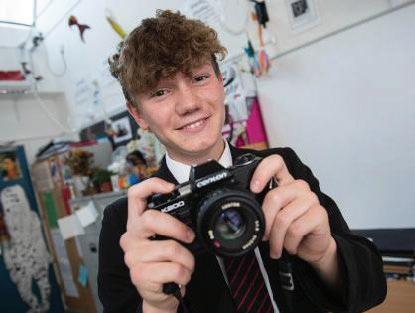
A levels in: Photography, Graphic Design, Media Design, Textiles, Fine Art and 3D design.
Possible Careers
Photographer, Commercial Photographer, Graphic Designer, Magazine Features Editor, Camera Operator, Journalism/ News Photography
Curriculum Leader- Mrs Parr - charly.parr@swale.at
PAGE 22
OPTIONAL SUBJECTS
Level 1/2 in Creative iMedia
Equivalent to GCSE
Course Content
Our Cambridge National in Creative iMedia quali cation will inspire and equip students with the con dence to use skills that are relevant to the digital media sector and more widely.
They will design, plan, create and review digital media products to meet client and target audience demands.
Course Structure
Unit RO93: Creative iMedia in the Media Industry
Unit RO94: Visual Identity and Digital Graphics
Unit RO95: Characters and Comics
Homework
Homework is set weekly and allows students to practice the concepts they are learning
Assessment
Exam Board: OCR
Written Exam: - 38%
Controlled Assessment: - 62%
Grading
Level 1 Pass, Merit, Distinction
Level 2 Pass(P2)
Merit (M2)
Distinction (D2)
Distinction* (*2)
Course Progression
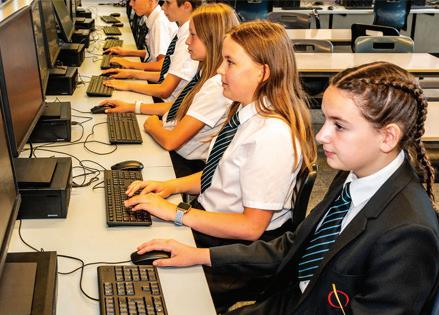
A level Media Studies, BTEC Creative Media Level 3 (Film and Television), BTEC IT Level 3 (Digital Marketing and Web Design).
Possible Careers
The digital media sector is one of the fastest-growing sectors in the UK. In an increasingly digital world, being competent in ICT and creativity is now considered a valuable skill in most jobs.
As well as supporting a range of subject and employment areas, the course also supports progression into employment through apprenticeships in areas such as Digital Marketing or Website Design.
Curriculum Leader - Mr Sam Hamblin - sam.hamblin@swale.at
PAGE 23
OPTIONAL SUBJECTS
GCSE Dance
It is highly recommended that students have had some prior dance training because of the high demands of the course.
Course Content
In Dance you will study performance, choreography and the appreciation of dance. You will develop your skills practically as both a performer and choreographer. Dance will provide you with the transferable skills/qualities associated with group work, creative thinking, resilience, self-esteem and leadership. Dance will also enhance your development as a physically educated young person; dance is an area that allows you to use your bodies for expression, communication of moods, ideas and emotions. There will also be opportunities to develop other areas of the curriculum: dance and poetry, dance and art, dance and science concepts, dance and cultural learning.
Course Structure
Unit 1 Performance and choreography students must perform two set phrases as a soloist (one minute) and in a duet/trio composition that is a minimum of three minutes in duration. Additionally, students will learn how to respond creatively to an externally set stimulus, to choreograph their own complete dance.
Unit 2 Dance appreciation knowledge and understanding of choreographic processes and performing skills, critical appreciation of own work and critical appreciation of professional works. Students will study six short professional works, which are choreographed by established choreographers. Works will cover a range of styles and style fusions including: ballet, urban, contemporary and dance from other cultures.
Homework
Both practical and theory homework is set. Dance club is one evening after school and all GCSE Dance students are encouraged to attend. GCSE practical homework sessions with teacher guidance and supervision happen regularly.
Assessment
Exam Board – AQA
Practical Assessment: Unit 1 - 60%
Written Exam: Unit 2 - 40%
Course Progression
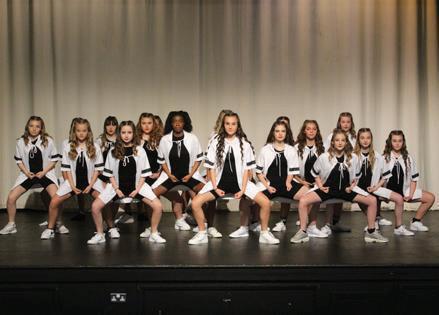
This GCSE will allow pupils to study Dance at AS and A-level, giving students the skills and experience to better prepare them for the demands of these courses.
Possible Careers
Dance Teacher, Choreographer, Performer, Dance Lecturer or Academic Researcher, Dance Education Specialist, Dance Movement Therapist, Dance Journalist, Costume/Set Design or Dance Producer.
Curriculum Leader - Miss Hulatt - emily.hulatt@swale.at
PAGE 24
OPTIONAL SUBJECTS
GCSE Design and Technology - Timber based materials
Course Content
This GCSE is a design course which places emphasis on understanding and applying design processes. Students will use their creativity and imagination to design and make real and computer-modelled prototypes that solve real and relevant problems, considering their own and others’ needs and wants. Students will use primarily timber-based materials such as plywood, but other materials and components enable interesting and more complex outcomes. Recent projects have involved lighting, home delivery, laminating curves, laser-cut plaques and animal care. Design challenges can be team-based, and students are encouraged to think outside the box, experiment and explore, learn from mistakes and build resilience. This is a modern and relevant quali cation where students will consider the impact of their design decisions on society and the environment.
Course Structure
Exam Paper:
Core technical principles including new and emerging technologies, energy, new materials, mechanisms and structures, textiles, metals and papers. Specialist technical principles including properties and processes focussed on timber-based materials. Designing and making principles including quality control, iterative design, communication techniques, and social and environmental factors.
Coursework:
A substantial research, design and make task set by the exam board in Year 10.
Homework
Homework will be based on exam-style questions, revision for short tests and research and evaluation work to complement their school-based projects.
Assessment
Exam Board: AQA
Written Exams: - 50%
Coursework: - 50%
Course Progression
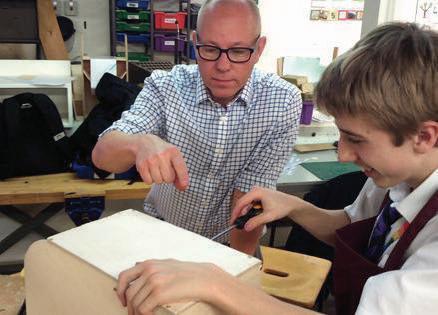
A-Level Product design, engineering, design courses, apprenticeships.
Possible Careers
CAD/CAM design, manufacturing, construction work or product design. Apprenticeships in engineering, mechanics, carpentry or building trades.
Curriculum Leader - Mr Cornish - phillip.cornish@swale.at
PAGE 25
OPTIONAL SUBJECTS
GCSE Drama
Course Content
The GCSE in Drama takes the form of three components studied over two years. It will enable students to work as either a performer or technical designer. The course aims to provide students with the knowledge and understanding of theatre and drama which will enable them to progress to A Level, Level 3 Btec and equip them with skills for a job in the Performing Arts industry.
Students will develop:
Performance skills
Design Skills
Essay writing skills
Ability to critique a performance.
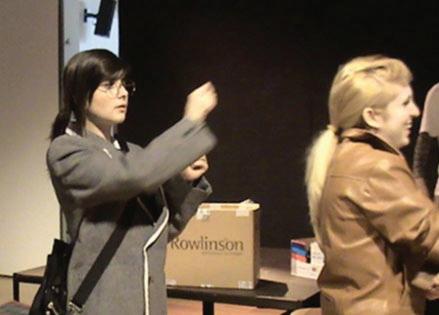
The ability to work as a team in a group. Responding to a brief independently and to time-sensitive deadlines.
Course Structure
The course is made of three components:
C1: Devising
This component is an exciting and challenging opportunity to work collaboratively with others to explore a range of stimuli in order to create an original performance piece. Devising is essential for the development of new theatre and performance; it allows for personal development and exploration. It allows both performers and designers the opportunity to stretch the limits of their creativity and imagination while exploring a theme or topic of interest to them and their intended audience. Students will develop skills in group work, research and negotiation, while also developing creativity, performance and design skills.
C2: Performing from a text
Understanding a performance text is fundamental to the subject of drama, as this provides students with opportunities to explore plot, structure, narrative and stories from around the world and from di erent time periods. This component deals with developing knowledge, understanding and skills in exploring and performing from a performance text. Students will interpret this text and rehearse and re ne two key extracts, leading to a nal performance either as a performer or technical designer.
PAGE 26
OPTIONAL SUBJECTS
C3: Theatre Makers in Practice
This component focuses on the work of theatre makers and looks at the theatrical choices made in order to communicate ideas to an audience. Students will develop their knowledge and understanding of the ways in which drama can create meaning for an audience through performance. At the end of this unit, students complete a written exam. In lessons leading up to the exam they practically explore a complete performance text, this exploration will give students an insight into how texts are brought to life for an audience and the creative roles within this process. Students will also analyse and evaluate their experience of a live theatre performance as informed members of the audience
Technical Design Option
In Drama GCSE there is an opportunity to opt to be a design student instead of a performer for Components 1 and 2.
Design Options are;
Lighting Designer
Stage/Set Designer
Costume/Makeup Designer
Homework:
Homework set will be work that will help the students with their Component 1 and 3. When it comes to rehearsing for Components 1 and 2, students will be expected to make arrangements to meet with their groups outside of the lesson to rehearse, but this is exible and does not need to be more than once a week.
Assessment:
Component 1: 60 marks, 40% of the quali cation, marked internally and veri ed by the exam board.
Component 2: 48 marks, 20% of the quali cation. Marked by a visiting examiner.
Component 3: 60 marks, 40% of the quali cation, 1 hr 45-minute exam.
Course Progression:
A-Level Drama and Theatre Studies, BTEC National Level 3 in drama, theatre studies or performing arts.
Careers:
Drama students can progress in the performance eld, or they can use the design and theatre maker experience to follow a career o -stage as part of the creative team. Outside of the performing arts, students can use a wide range of transferable skills to prepare them for careers in law, medicine, and business.
Curriculum Leader: Emily Stephens - emily.stephens@swale.at
PAGE 27
OPTIONAL SUBJECTS
Level 2 Vocational Award in Hospitality and Catering
Course Content
This is an exciting and practical course for those with a passion for cooking, looking to work in a customer facing occupation like sports and leisure, travel and tourism and catering. Plus this course o ers essential life skills in budgeting, shopping and a wide variety of food preparation and service. The WJEC Vocational Award in Hospitality and Catering equips you with theoretical knowledge about the industry as well as enabling you to develop practical skills in planning, preparing and cooking a variety of dishes. Each unit has been devised around the concept of a ‘plan, do, review’ approach so that you take part in practical activities in di erent contexts in order to learn the related theories. The quali cation provides you with a broad appreciation of work in the hospitality and catering sector and wider opportunities for progression into further education, employment and training.
Course Structure: This quali cation is made up of 2 units.
Unit 1: The Hospitality and Catering Industry : You will learn about the hospitality and catering industry, the types of hospitality and catering providers and about working in the industry. Learn about health and safety, risk assessments, job roles and opportunities and food safety in hospitality and catering, along with food relatedfood-related causes of ill health.
Unit 2: Hospitality and Catering in Action: You will learn about the importance of nutrition and how cooking methods can impact nutritional value. Learn how to plan nutritious menus and the factors which a ect menu planning. You will learn the skills and techniques needed to prepare, cook and present dishes and learn how to review your work e ectively.
Homework
will be based on exam-style questions, revision for short tests and research work, which will complement your school-based projects. Tasks may extend your knowledge and understanding of the industry and develop your practical skills. There will be many opportunities to take part in the planning and preparation of catering events in and out of school.
Cultural Capital: There are many exciting opportunities to visit local businesses, including hotels, restaurants, theme parks and catering manufacturers along with visits from industry leaders from across the hospitality sector both commercial and non commercial including the Army & Royal Navy.
Assessment
Exam Board: EDUQAS
Unit 1 is assessed through an exam worth 40% of the quali cation. In Unit 2, you will complete a 12-hour assignment where you plan and prepare a menu in response to a brief, accounting for 60% of the quali cation. Grade Comparisons: GCSE Grade 8-9 = Level 2 Distinction*, GCSE Grade 7 = Level 2 Distinction, GCSE Grade 5-6 = Level 2 Merit
Course Progression
Upon completion, you may progress to other relevant quali cations such as WJEC Level 3 Applied Certificate/Diploma in Food Science and Nutrition, Level 2/Level 3 Diplomas in Hospitality and Catering, Level 2/Level 3 Diplomas in Professional Cooking, or Level 3 Diploma in Hospitality and Tourism Management.
Possible Career
Teaching and Lecturing, Hospitality Industry Careers, Chefs, Managers, Customer Service, Food & Drink Service, Dietician, Sport Science and Nutritionist, to name but a few.
Curriculum Leader - Mr Desborough - gavin.desborough@swale.at
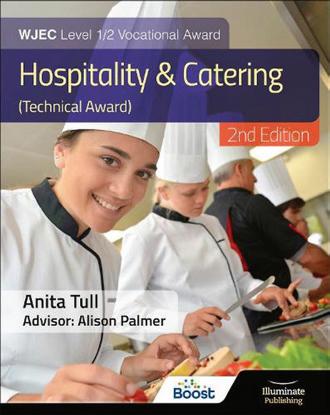
PAGE 28
OPTIONAL SUBJECTS
BTEC Music: Level 1 / 2 Technical Award in Music Practice
Course Content
This course is for learners who want to acquire Music sector-speci c applied knowledge and technical skills by studying and developing their musical skills and techniques, and by responding to a Music industry brief as part of their Key Stage 4 learning. The quali cation enables learners to develop their skills, such as using musical elements, music creation, performance and music production. Students explore realistic contexts, and develop personal skills, such as self-development; responding to a brief; planning; and time management through a practical and skills-based approach to Music.
Course Structure
Component 1: Exploring Music Products and Styles - In this component, you will develop your understanding of di erent types of music products and the techniques used to create them. You will explore how musical elements, technology and other resources are used in the creation, production and performance of music. You will also practically explore the key features of di erent styles of music and music theory and apply your knowledge and understanding to developing your own creative work. Component 2: Music Skills Development - As a performer, producer or creator in the music industry, you need to continually develop your skills and techniques in order to be successful and secure a regular ow of gigs and commissions. In this component, you will participate in workshops and classes where you will develop technical, practical, personal and professional skills and specialise in at least two of the following areas: music performance, creating original music, and music production. Component 3: Responding to a Music Brief - This component will allow you to work to your strengths and interests and apply the skills that you have learned throughout your course in a practical way. You will focus on a particular area of the music sector that excites and appeals to you and respond to a music brief as a composer, performer or producer. You will develop and present an original creation based on a piece from a given list and a style from a choice of four. You will then present this as a solo or group performance, an audio recording or a Digital Audio Workstation (DAW) project. Activity 1: Initial response to the music brief
Homework
You will have 1 hour of homework per week which will focus on practising your instrument /voice, keeping a rehearsal diary and completing written tasks for each component.
Assessment
Exam Board: Pearson
Component1: 30%(internally assessed and externally moderated)
Component 2: 30% (internally assessed and externally moderated)
Component 3: 40% (externally assessed)
Course Progression
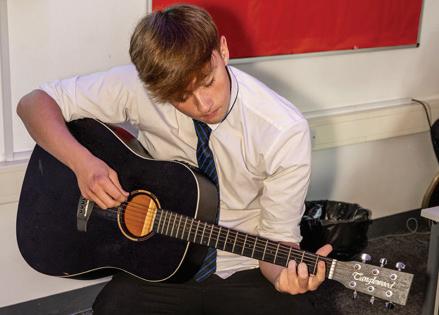
A Levels (including Music) as preparation for entry to higher education in a range of subjects. Study of a vocational quali cation at Level 3, such as a BTEC National in Music or a BTEC National in Music Technology, which prepares learners to enter employment or apprenticeships, or to move on to higher education by studying a degree in the music sector.
Possible Careers
Musician, singer, musical theatre performer, recording artist, music teacher, music journalist, sound engineer, production, events management, retail etc.
Curriculum Leader- Mr Himsworth - thomas.himsworth@swale.at
PAGE 29
NCFE Level 1/2 Technical Award in Health and Fitness (PE)
Equivalent to GCSE
Course Content
This quali cation will show students the bene ts of tness, the main components used to measure an individual’s level of physical tness, how to use the principles of training in a tness programme, how to prepare, plan and develop a personal health and tness programme and how a healthy balanced diet a ects lifestyles. Students will learn about the functions of the main body systems, how to use di erent training techniques and methods and the importance of diet and nutrition. They will develop skills by preparing and planning a health and tness plan, by carrying out tness tests and evaluating health and tness plans. The skills that they develop in literacy, numeracy and ICT are essential for the modern workplace along with teamwork; presentation skills; independent working; working to deadlines and e cient use of resources.
Course Structure
The course is set across eight content areas. Each content area is explained below and all link to both the exam assessment (40%) and the Controlled Assessment (60%). Combined these two assessments that cover all eight content areas equal to the students outcome in the summer of Year 11. This is a two-year course and all content is covered in theory (IT rooms) and practical lessons. We also lead a trip annually for our Year 11 students to the University of Brighton where all eight content areas are covered amongst theory and practical lessons with specialist teachers at the university.
Learners study: The structure and function of body systems. The e ects of health and fitness activities on the body. Health and fitness and the components of fitness. The principles of training. The impact of lifestyle on health and tness. Testing and developing components of fitness. Health and fitness analysis and setting goals. Planning, developing and taking part in a health and tness programme and understanding how to prepare safely.
Homework
Homework will be based on student’s needs and will vary from GCSEPod, reading, research and completion of set tasks in our online workbooks.
Assessment
Exam Board: NCFE
Exam: 40%
Controlled Assessment: 60%
Course Progression
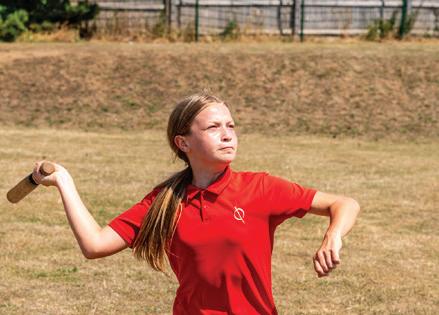
This course allows students to study A level, National Diploma and Level 3 certi cates as well as a variety of apprenticeships.
Possible Careers
PE teacher, Sports analysis, Sports coach, Personal trainer, Sports Therapy, Nutritionist & more
Curriculum Leader - Mr Clarke - james.clarke@swale.at
OPTIONAL SUBJECTS PAGE 30
Pearson BTEC Level 1/Level 2 Tech Award in Health and Social Care (To be con rmed)
What is the health and social care sector?
About 3 million people in the UK work in health and social care. In healthcare, this includes jobs such as doctors, pharmacists, nurses, midwives, healthcare assistants and administrators, while social care roles include care assistants, social workers, occupational therapists and counsellors. Demand for both health and social care is likely to continue to rise, so it is sure to continue to play a key role in UK society, and the demand for people to ll these vital jobs will increase.
What does the quali cation cover?
This course gives you the opportunity to study how people grow and develop over the course of their lives, from infancy to old age, and the factors that may a ect this, such as major life-changing events like marriage or parenthood. You will learn how people adapt to these changes as well as the types of support available to help them. You will also learn about the di erent health and social care services, and about ‘care values’ and their importance in making sure that the people who use these services get the care they need. You will be able to demonstrate these care values practically. You will develop skills in interpreting data about someone’s state of health in order to design a plan that will allow them to improve their health and well-being. This new quali cation is the same size and level as a GCSE and is aimed at everyone who wants to nd out more about health and social care. This course will give you the opportunity to develop skills, knowledge and techniques, and to review your own performance in demonstrating ‘care values’.
What does the quali cation cover?
You will carry out tasks during the course. Your teacher will mark these, which will give you an idea of how you are progressing. Towards the end of the course, you will complete one larger task, where you use the knowledge, skills and techniques you have learned to design a Health Improvement Plan. All the work you do throughout the course prepares you for this larger task, which is externally marked.
Assessment
1 - Human life-span and development - Level 1/2 - Coursework
2 - Health and Social Care Services and Values - Level 1/2 - Coursework
3 - Health and Wellbeing - Exam (2 hours, 60 marks)
The three components focus on the assessment of knowledge, skills and practices. These are all essential to developing a basis for progression and, therefore, learners need to achieve all components in order to achieve the quali cation.
Where will this take me?
When you have completed this quali cation, you will have developed a practical understanding of the health and social care sector. Because you will be building useful skills not generally covered in GCSE courses, you will have a better understanding of whether this is an area you want to continue to study. This course will also help you develop transferable skills and knowledge, such as observation, teamwork, good knowledge of life stages and promoting awareness of rights, communication, respect, competency in the workplace. After you have nished this course you may want to go on to further study, such as A levels, BTECs or a mixture of both. Or you might want to nd work in the health and social care sector as a trainee or apprentice. Students may progress on to Nursing, Midwifery, Counselling and job roles in the NHS, Health Promotion, Teaching and Educational Support work, Social Work, Probation and Police, Youth and Community Work, Nursery Nursing, Child Care Management and and Public Health Work. Opportunities are available in your area of interest.
Curriculum Leader - Olivia L’entang - olivia.letang@swale.at
OPTIONAL SUBJECTS PAGE 31
GCSE Sociology
Course Content
Sociology is the study of human society. It draws on a variety of viewpoints in order to understand the social world around us, in an open and critical manner. It concentrates on the way we make society, what it is and how society shapes us.
You will relate this to your own experiences of living in Britain. You will also study how societies have changed over time and how it di ers across cultures.
By studying Sociology you will develop a wide range of knowledge and understanding about how Sociologists study and understand social structures, processes and issues.
You are encouraged to take a questioning approach to evidence and issues, thus developing critical, analytical and evaluative skills.
Students should be aware that this is a challenging GCSE. They will need to have strong literacy skills and be con dent at writing essays. Students will need to be motivated, independent learners at school and home.
Course Structure
Unit 1 - The Sociological Approach and Research Methods
Unit 2 - Families
Unit 3 - Education
Unit 4 - Crime and Deviance
Unit 5 - Social Strati cation
Homework
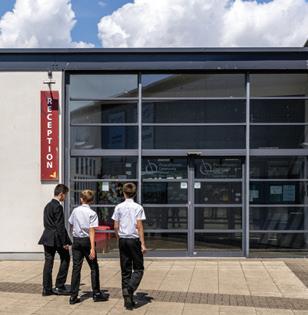
Homework in Sociology will be fortnightly Seneca quizzes, to consolidate previous learning.
Assessment
There is no coursework for GCSE Sociology. Students will sit two exam papers at the end of Year 11.
Exam Board: AQA
Written Exam: Paper 1: The Sociology of Families and Education - 50% (100 marks)
Paper 2: The Sociology of Crime and Deviance and Social Strati cation - 50% (100 marks)
Course Progression
A Level Sociology, A Level Law, A Level Psychology, A Level Politics
Possible Careers
Lawyer, Doctor, Nurse, Teacher, Social Worker, Health Worker, Childcare, Journalism.
Curriculum Leader- Mrs Wharfe - anna.wharfe@swale.at
OPTIONAL SUBJECTS PAGE 32
OPTIONAL SUBJECTS
GCSE Further Mathematics and Statistics
Course Content
This is a very exciting course that is targeted at high achieving, mathematically minded students. This course pairs together GCSE Statistics and GCSE Further Maths thereby allowing students to gain two extra GCSEs. This assesses their higher-order mathematical skills and thus prepares them fully to maximise their potential in further studies. The course o ers the opportunity for stretch and challenge, building on the Key Stage 4 curriculum and is intended as an additional quali cation to GCSE Mathematics, rather than as a replacement.
The Further Maths Element provides an opportunity for students to study in greater depth and breadth the areas of algebra and geometry, both of which are crucial to further study in the subject. There is an emphasis on higher order technical pro ciency, rigorous argument and problem solving skills. It also gives an introduction to calculus and matrices and develops further skills in trigonometry, functions and graphs.
There has never been a time of greater statistical signi cance, with information constantly being and we’re often bombarded with gures that can be misleading. The Statistics element Statistics will provide a strong foundation to understand information students are exposed to and equip them for further academic and vocational study and for employment. It gives students the appropriate mathematical skills, knowledge and understanding to help them progress to a full range of courses in further and higher education. This includes Maths courses as well as courses in other disciplines such as Science, Geography, Business and many others, where the understanding and application of statistics is crucial.
Course Structure
In Further Maths students will learn: Numbers, Algebra, Coordinate Geometry, Calculus, Matrix Transformations, Trigonometry
In Statistics Students will learn:
Data Collection, Data Processing and summarising, Scatter Diagrams and Correlation, Times series diagrams, Probability, Index numbers, Probability distribution
Homework
It is recognised that for a student to make expected progress in Maths they need to complete regular homework. This may vary from independent practice to past paper questions to allow students to ensure they have understood topics covered in class.
Assessment
Students will be taught content to receive two GCSEs for this subject one in Statistics and one in Further maths. There will be two written exams for each subject at the end of year 11 Statistics Exam Board: Edexcel
Further Maths Exam Board: AQA
Course Progression
A-Level Maths, or Further Maths, Sciences, Sociology, Engineering, Accountancy.
Possible Careers
Engineer, Scientist, Statistician, Architecture, Social Scientist, Researcher, Analyst
Curriculum Leader - Mr Leonce - ezra.leonce@swale.at
PAGE 33
FREQUENTLY ASKED QUESTIONS
Which subjects do I have to study?
All Core Subjects:
English Language | English Literature | Mathematics| Science|
Geography or History or French or Spanish | Physical Education
Do all of the subjects/courses lead to a GCSE or equivalent?
All of our courses are GCSEs or equivalent vocational courses (BTECs Cambridge Nationals and V Certs). All of these quali cations can lead to further study at A Level and Level 3 in college. Vocational quali cations tend to be more practical in nature with ongoing continuous assessment and are more closely linked to vocational (work) related pathways. However, they do have one externally assessed unit which counts for between 25 - 40% of the overall grade, depending on the quali cation.
When do I have to make my choices by?
The nal deadline for your options to be completed is Friday 15th March 2024.
Am I guaranteed to get my top preferences?
In many cases, we will be able to give you most of the courses that you have put at the top of your list but this is not always possible, particularly if you have chosen a popular subject. Realistically you could be given any of your preferences so you must consider all choices wisely. In very rare cases, we need to ask you to make further choices if your individual combinations of subjects do not t the options blocks or if a course does not run.
Are there any restrictions on what I can choose?
Not all subjects are the same as they all have di erent demands on them such as types of assessment and learning styles. For some subjects, it is important that you have studied it before, for example, a high level of mathematical ability is required for subjects such as Computer Science. It is important to follow the steps mentioned below so that sta can guide you onto the right courses, where you will be most successful and therefore much happier in your learning.
It is also recommended that you have a broad and balanced curriculum. If you are thinking of taking subjects that are very similar, sta will talk this through with you and help you consider the pros and cons of specialised choices. You might nd that your choices are very popular ones and even though we will do our best to give you your most preferred options we are restricted by the number of classes that we can put on with the number of sta that we have. It is for that reason that your favourite subject should go right to the top of your ranking.
What is the English Baccalaureate and do I have to take it?
This is a performance measure for schools and something that the government is keen that every student achieves. It is made up of the following quali cations:
English (grade 5 and above in Language and Literature), Mathematics, History or Geography, The Sciences, including Computer Science, A language
The English Baccalaureate will give you many of the skills that are needed to successfully move on to further study and the world of work and is looked upon favourably by the majority of universities.
PAGE 34
HOW DO I DECIDE WHICH SUBJECTS TO CHOOSE?
Speak to your teacher
Attend options evening / parents evening
Taster Sessions
1:1 Interview
They know you really well and can help to see whether the subject or course will be suitable for you. Don’t forget your mentor. They can help to look at your combination of choices to see if they go well together.
Every option subject will be represented. You will be free to discuss the courses with your parents/carers and speak to sta about the di erent courses available and that you are interested in. Options Evening is on Thursday 9th March 2023.
You will have the opportunity to try GCSE lessons during your normal timetable from Monday 6th March 2023. This will help you to nd out more about the subject and how it is structured.
1:1 interviews will be arranged after the 27th March 2023
This will be a nal opportunity for you to discuss your options with a senior member of sta . They can help you choose between courses if you are struggling to decide or con rm that the courses you are thinking of choosing are appropriate for you.
Talking to parents for support and guidance?
It is also important as well as the points above that you continue to talk and discuss your options with your parents. They are there to o er support and guidance, and they will need to sign o your options form to say that you have had a conversation with them and that they agree with your option choices.
What if I can already speak another language, would that count instead of having to take Spanish as part of the EBACC?
Yes, a number of other languages could count but you must check this with the languages department and you will have to take an actual GCSE in your heritage language. There might also be the opportunity to take this exam much sooner than the end of Year 11 if you are ready.
When will I receive my nal options?
Letters will be sent out to all students after the Easter holidays, in term 5, to con rm the KS4 courses you will be taking in September 2023.
Can I change my mind once I have been allocated my options?
It is very di cult to change an option once you have made it. All classes are made by the combination of choices from all students. If you change your mind, we may not be able to change your choice at all. It is better to do as much research as possible, make a decision and then stick with it.
Where can I nd further information to help me with my choices?
The school website has a page with useful information about post-16 and career choices to help you decide.
PAGE 35
ACCESS TO CAREERS INFORMATION & ADVICE
Students can use the school’s library to research their options and the quali cations that they may need. The library contains a lot of useful Careers-based resources.
While a small number of students go on to apprenticeships or other employment (with training) after Year 11, most PCS students go on to one of the following colleges on leaving school: BHASVIC, Varndean College, Sussex Downs, MET College or Plumpton College.
Courses are available in academic and vocational subjects at each of the following levels:
Pre-Foundation/Entry Level
Foundation (Level 1, equivalent to levels 3-1 on the GCSE grade scale)
Higher (Level 2, equivalent to levels 9-4 on the GCSE grade scale)
Advanced (Level 3, equivalent to components of A Level courses)
Students can move from one level to the next if they are successful and progress to higher levels at University.
On leaving school students can choose to gain a variety of further quali cations, including: A Levels and Applied A Levels
International Baccalaureate
City and Guilds
NVQ Levels 2 and 3
BTECs (a range of quali cation sizes is available) at Level 2 or 3
GCSE courses
Please be aware that any student who fails to achieve a grade 4 in English and/or Mathematics in Year 11 will have to study for and retake the subject(s), until this grade is achieved, as part of a further education programme of study.
Some opportunities in education and in employment are open to applicants with any combination of subjects while others are much more speci c about which subjects they will accept; Entry requirements to University vary enormously.
Students should make sure that they will hold suitable quali cations to allow them to move on to the courses of their choice.
Entry requirements for apprenticeships also vary. Some opportunities do require speci c subjects and grades, while others are more exible.
If you are in any doubt, about anything, please do ask a member of sta for help.
Good luck with your planning!
PAGE 36
QUALIFICATIONS GUIDE
LEVELS
All educational quali cations in England and Wales are grouped into levels as follows:
Entry Level = Below GCSE Grade 1
Level 1 = GCSE Grade 3 – 1
Level 2 = GCSE Grade 9 – 4
Level 3 = AS / A Level
Level 4 = Certificate of Higher Education (University Year 1)
Level 5 = Diploma of Higher Education (University Year 2)
Level 6 = Bachelor’s Degree (University Year 3)
Level 7 = Master’s Degree
Level 8 = Doctorate
Peacehaven Community School o ers its students the opportunity to achieve quali cations at Level 1 and preferably Level 2, so that they can progress to study on Level 3 courses post-16.
Quali cations that are not GCSEs (ASDAN, BTec Cambridge National, VCert, VRQs) can be achieved at each level with a Pass, Merit, Distinction or Starred Distinction
The 0.5 gures are included for indicative purposes only, i.e. to show the equivalence to the GCSE grades system. For example, a student earning a Merit in PE BTEC Level 2 would earn the equivalent of 5.5 GCSE points.
GCSEs
Virtually all GCSEs are assessed through exams at the end of the course (May/June of Year 11), although some (e.g. PE V Cert& Art) do still have a non-examination assessment component.
HOMEWORK
It is vital that homework is completed appropriately during Key Stage 4. Many tasks set will cover several homework sessions and will help to secure knowledge and understanding, thus the quality of work completed at home will often directly a ect the overall grade achieved in a subject. Homework details will of course be accessible via Google Classroom on the School’s website.
MORE INFORMATION
Further details on the most of the courses listed in this booklet can be found on the websites of the main examining boards:
www.aqa.org.uk
www.ocr.org.uk
www.edexcel.com
www.wjec.co.uk
PAGE 37
Greenwich Way
Peacehaven East Sussex BN10 8RB
Telephone - 01273 581100
Email - pcs-enquiries@swale.at
Website - www.phcs.org.uk
Twitter - @PCS_Peacehaven
Instagram - _phcs























